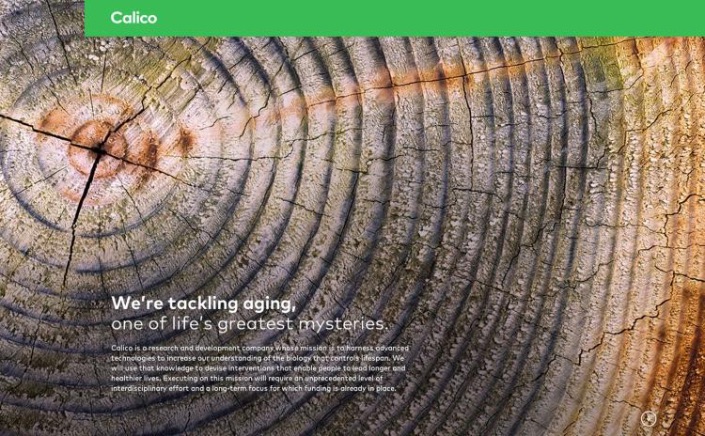Google Calico: Pursuing immortality

It seems to be an ancestral question: will humanity ever defeat ageing? Google announced a new biotech startup called Calico back in 2013, whose explicit goal is to take charge of aging and finally find the answer to this question. The ambitious quest to reverse the ageing process and extend human life is being pursued by this new company and financed by several billions of dollars. But what is the real focus of Google?
With its proliferation of businesses, products and services, it would be easy to forget that not long ago Google was just a search engine. Today, the ramifications of the expanding global corporation range from driverless cars, smartphones, tablets and even launching giant balloons to nearby space. In the midst of this growing portfolio of diffuse interests and initiatives, its latest company has been added: Calico, directed by Arthur Levinson, best known for being the former CEO of pioneer biotechnology Genentech and current president of Apple.
Calico, or California Life Company, has been established to research issues related to ageing and its associated diseases. When presenting Calico at a press conference, Google said that this new and independent company would focus heavily on age-related conditions such as Alzheimer's, cancer and heart disease. Larry Page, CEO of Google, said: “Diseases and ageing affect all of our families, and with some long-term considerations about health care and biotechnology, I believe we can improve millions of lives”.

In an interview with Time magazine, Page suggested that it might take 10 to 20 years before Calico's efforts bear fruit. But Page also said that Calico's mission could be even more important than curing cancer: “One of the things that I thought was amazing is that if you cure cancer, you would add about three years to people's life expectancy. But you have to think beyond”.
What do the experts think?
Aubrey de Gray, an expert in the field of regenerative medicine, told CNN that Calico will not limit his approach to a single disease: “Page's and Levinson's statements so far indicate quite strongly that the emphasis will not be just cancer, nor even a single variety of specific diseases, but it will be ageing itself. Page, in particular, has highlighted the insignificant gains in longevity that would arise even by completely eliminating cancer”.
João Pedro de Magalhães, a Portuguese biologist who leads the Integrative Genomics of Ageing Group at the University of Liverpool, agrees: “From what I've read, I do not think the company focuses primarily on cancer. In the aforementioned Times interview, Larry Page clearly states that solving cancer “is not as big an advance as we might think”. This is reminiscent of what experts studying ageing have been saying for a long time. In order to really make a difference in human health and longevity, it is necessary to address the ageing process rather than individual age-related diseases”.
But the question is, what does Calico really want to do?

The team led by Arthur Levinson has doctors, molecular biologists, experts in medicines and geneticists and whose main objective is to develop long-term proposals, as well as mechanisms to achieve what some call the “cure of death”.
On the Calico website, its intentions are well captured. “Beyond genetics, we focus on the characteristics of ageing, including proteostasis, stress responses, cellular energetics and senescence. In terms of our key therapeutic areas, these include oncology, neurodegeneration, chronic inflammation and metabolic dysfunction, because the incidence of these conditions increases sharply in old age and is associated with high morbidity”.
Calico, in addition, seeks weighty collaborations that can contribute more to the cause: “We actively seek new discovery platforms in the areas of DNA sequencing and phasing, mass spectrometry, imaging, machines, and computing”.
In fact, since 2014 it has been able to partner with AbbVie, with whom it undertook to open an R & D center, the Southwestern Medical Center of the University of Texas, the Buck Institute for Research on Aging and the BroadInstitute, respectively, the California Institute for Quantitative Biosciences and the AncestryDNA genealogical database.
More recently, Calico has taken the support of the biotech giant C4 Therapeutics, a company that has developed molecules capable of performing two functions at the same time. Both companies are now looking for small molecule-protein scavengers to work as therapeutic agents. “Thus, through the alternative strategy of directing these proteins towards degradation, it is possible that we have the opportunity to identify promising new treatment alternatives”, they affirm from Calico. “Calico's leadership team has a long history of innovation and our combined efforts are aimed at presenting new options for patients affected by devastating diseases such as cancer”, said Andrew Philips, president and scientific director of C4 Therapeutics.
Calico (we should not forget that it belongs to Google) believes that in order to reach its goal, it will need access to cutting-edge technologies, tools and infrastructures, something they are looking for tirelessly: “We actively seek new discovery platforms in the areas of DNA sequencing and phasing, mass spectrometry, images, machine learning and computation”, concludes Larry Page.
Will Google slow down ageing?
